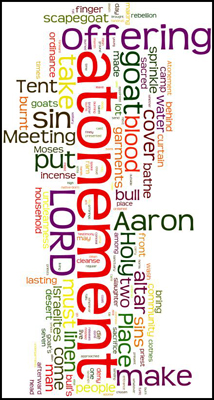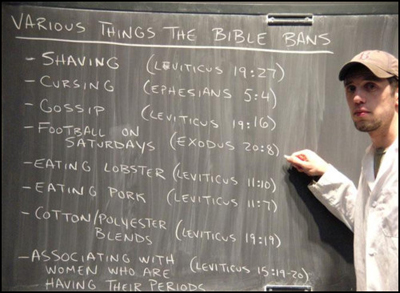On Homosexuality
 It’s no surprise to anyone that technology has proven to be very beneficial for our society. And because of technology, the cultures and ways of the world are now easily placed right in our living rooms. So, obviously, we would naturally experience a little bit of backlash towards some of these things that are foreign to us but the goal is that, in time, we would come to have a love and appreciation for these unfamiliar things as well.
It’s no surprise to anyone that technology has proven to be very beneficial for our society. And because of technology, the cultures and ways of the world are now easily placed right in our living rooms. So, obviously, we would naturally experience a little bit of backlash towards some of these things that are foreign to us but the goal is that, in time, we would come to have a love and appreciation for these unfamiliar things as well.
 Nothing is more relevant in this regard than the hot and confused topic of homosexuality. With the growing influence of technology on our lives, we’re brought face to face with the homosexual community be it through television, movies, artwork, music, politics, etc. As a child we’re taught, by grown-ups, the traditional views on marriage that fall all the way back to evolutionary progression for the overall goal of reproduction. And this is the way the world has worked for as long as we humans have inhabited it.
Nothing is more relevant in this regard than the hot and confused topic of homosexuality. With the growing influence of technology on our lives, we’re brought face to face with the homosexual community be it through television, movies, artwork, music, politics, etc. As a child we’re taught, by grown-ups, the traditional views on marriage that fall all the way back to evolutionary progression for the overall goal of reproduction. And this is the way the world has worked for as long as we humans have inhabited it.
Speaking strictly as a human not tied up in any one religion’s perspective, it’s easy to see why so many people consider this way of life foreign even though they don’t view it on bad or sinful terms. But if we were viewing things just on evolutionary terms then it would also to us be foreign (leading some to cast our nets of oppression on what we deem “sinful”) that some choose a life of celibacy or some choose to use contraception. The problem isn’t reproduction, the problem is xenophobia. I’ve been over and over this in my mind and I’m always left with one conclusive opinion: those who bash homosexuality are just perfect examples of xenophobic behavior towards what ends up being foreign to them.
Not too long ago a North Carolina pastor had the idea to take all homosexual individuals and put them in fences enclosed by electricity with the hopes that, without reproduction, further homosexual activity would cease to carry on. Aside from his gaping theory and nescient plans, the pastor went on to say something that really stood out to me. In this sermon we see that he’s struggling with whether or not to say what he’s about to say on the pulpit then, finally, finds the strength to verbalize his xenophobia, “Can you imagine kissing some man?” In this question lies the fear and misunderstanding of what is foreign to the individual and in his sermon lies the common behavior to attack what we don’t understand.
 Now, speaking strictly from a Christian perspective, I’ve adopted a more liberal theology on the issue and have found no good evidence to lead me to the end point of homosexuality being a sin. Most Christians from this point, after a case of moral dumbfounding stirred by xenophobic behavior, will turn to the Bible to find spiritual advocacy to assuage their fears. But the Bible, I’m afraid, is difficult to trust in this manner because even Christians come to it like a lunch line in a school cafeteria, picking from the options what we like and leaving behind what we don’t like.
Now, speaking strictly from a Christian perspective, I’ve adopted a more liberal theology on the issue and have found no good evidence to lead me to the end point of homosexuality being a sin. Most Christians from this point, after a case of moral dumbfounding stirred by xenophobic behavior, will turn to the Bible to find spiritual advocacy to assuage their fears. But the Bible, I’m afraid, is difficult to trust in this manner because even Christians come to it like a lunch line in a school cafeteria, picking from the options what we like and leaving behind what we don’t like.
 For example, in the Old Testament the Jewish people were given a lot of rules to abide by in the book of Leviticus. In Chapter 20 of the book of Leviticus, right before condemning homosexuality, it states that if a man should commit adultery with the wife of his neighbor, he shall be put to death. Now, Jesus later says in Matthew 5: 27-30 of the New Testament that whoever looks at a woman with lust has already committed adultery in his heart which means, if kept by religious law, the population of men would fall drastically. Sandwiched between Chapters 18 and 20 of Leviticus (the main “go-to” section of the Old Testament in regards to homosexuality) is the very confusing and less talked about Chapter 19 wherein God supposedly lays down a multitude of strange laws from “not round[ing] off the hair on your temples or mar[ing] the edges of your beard,” to “not sow[ing] your field with two kinds of weed or put[ing] on garment[s] made of two different materials,” both of which most human beings have not faithfully kept. When reading over these verses it’s clear that we often, unknowingly, come to the Bible with a cafeteria style mentality instead of taking the time to read the text in its historical context and understand that the Bible, while being the word of God, was written by fallible human beings whose failures and limitations show up in the text (for more on this see Sacred Word, Broken Word by Kenton L. Sparks).
For example, in the Old Testament the Jewish people were given a lot of rules to abide by in the book of Leviticus. In Chapter 20 of the book of Leviticus, right before condemning homosexuality, it states that if a man should commit adultery with the wife of his neighbor, he shall be put to death. Now, Jesus later says in Matthew 5: 27-30 of the New Testament that whoever looks at a woman with lust has already committed adultery in his heart which means, if kept by religious law, the population of men would fall drastically. Sandwiched between Chapters 18 and 20 of Leviticus (the main “go-to” section of the Old Testament in regards to homosexuality) is the very confusing and less talked about Chapter 19 wherein God supposedly lays down a multitude of strange laws from “not round[ing] off the hair on your temples or mar[ing] the edges of your beard,” to “not sow[ing] your field with two kinds of weed or put[ing] on garment[s] made of two different materials,” both of which most human beings have not faithfully kept. When reading over these verses it’s clear that we often, unknowingly, come to the Bible with a cafeteria style mentality instead of taking the time to read the text in its historical context and understand that the Bible, while being the word of God, was written by fallible human beings whose failures and limitations show up in the text (for more on this see Sacred Word, Broken Word by Kenton L. Sparks).
 The second argument against homosexuality is found only in the Pauline epistles of the New Testament (it seems very odd to me that of all the things Jesus did cover during his time on Earth that are recorded in the gospels, homosexuality isn’t one of them). In the first letter to the church located in Corinth, Paul writes in Chapter 6:9-11, “do you not know that wrongdoers will not inherit the kingdom of God? Do not be deceived: Neither the sexually immoral nor idolaters nor adulterers nor men who have sex with men nor thieves nor the greedy nor drunkards nor slanderers nor swindlers will inherit the kingdom of God.” Paul is pretty straight forward with what he believes to be immoral in this verse. The only problem is that later in this very same letter, Paul writes in Chapter 14:34-35, “Women should remain silent in the churches. They are not allowed to speak, but must be in submission, as the law says. If they want to inquire about something, they should ask their own husbands at home; for it is disgraceful for a woman to speak in the church.“
The second argument against homosexuality is found only in the Pauline epistles of the New Testament (it seems very odd to me that of all the things Jesus did cover during his time on Earth that are recorded in the gospels, homosexuality isn’t one of them). In the first letter to the church located in Corinth, Paul writes in Chapter 6:9-11, “do you not know that wrongdoers will not inherit the kingdom of God? Do not be deceived: Neither the sexually immoral nor idolaters nor adulterers nor men who have sex with men nor thieves nor the greedy nor drunkards nor slanderers nor swindlers will inherit the kingdom of God.” Paul is pretty straight forward with what he believes to be immoral in this verse. The only problem is that later in this very same letter, Paul writes in Chapter 14:34-35, “Women should remain silent in the churches. They are not allowed to speak, but must be in submission, as the law says. If they want to inquire about something, they should ask their own husbands at home; for it is disgraceful for a woman to speak in the church.“
And, I’m afraid that for conservatives, we’re back to choosing between the lesser of two evils as the question always seems to be which ridiculous rules do we keep and which do we throw away. Is it homosexuality we should rise up to oppose or is it women speaking in the church…or both…or neither? I think the truth lies again in understanding historical context and the fallibility of man rather than the “eternal and unchanging word of God.”
The third and final argument I’ll touch on stems from the very beginnings in Genesis where God creates man and woman and deems it good. These opening verses can be understood one of two ways depending on the hermeneutics of the individual. In Genesis, did God create a helper and partner of the opposite sex because that’s how he wishes marriage to be fulfilled or is it for the value in reproduction seeing as just before, in Genesis 1:28, he says, “be fruitful and increase in number; fill the earth and subdue it”? This issue, within the book of Genesis, cannot be clearly defined as God’s ordinance for traditional marriage but must be more open to different kinds of exegesis. I would also add that for the argument of the validity of this text, if anyone could give evidence for the historicity of Adam and Eve, then by all means I will view the text differently but I find that to be a very difficult task for whomever wishes to research it.
 Please understand that I’m not saying we should throw out the baby with the bathwater when it comes to the Bible; there are some really good things in there but in order to appreciate them we have to take our time with them, studying the history as well as the book.
Please understand that I’m not saying we should throw out the baby with the bathwater when it comes to the Bible; there are some really good things in there but in order to appreciate them we have to take our time with them, studying the history as well as the book.
As far as homosexuality, to me what matters most is not what race, religion, culture, or sex a married couple must be but rather that two people would love and serve one another, honoring and keeping their marital vows they made to one another before God. For this country, homosexuality isn’t the issue or the problem; the problem lies in selfishness and loving one’s self more than spouse, family, or anyone else. In the time of Jesus, Samaritans were very much looked down upon in the Jewish community and yet Jesus used them as the example for loving our neighbors wherein the Samaritan was the only one that did right by man and God. Take a moment to imagine just how shocking this was to Jesus’ audience.
 Now we live in a time where freedom of marriage and divorce has ruined our appreciation and longing for our spouse, and where celebrities are providing much influence for divorce and the sad fact that two people cannot remain together, loving and serving one another in joy and happiness. On the other side of the coin are homosexual individuals who long to marry one another before God and the state but are denied because we have yet to see that traditional marriage hardly exists anymore when, statistically, half of marriages end in divorce. With that said I wonder if we’ll be shocked (just as the Jewish people in Jesus’ time) to find that it could be homosexual marriage that reveals to us the true nature of marriage in longing to be with and serve the one we love. Through the beneficence of technology I recently watched two gay men get married and to see their compassion, their fervor, their glowing and radiant love makes me again wonder if homosexual marriage will reveal to us the kingdom of God.
Now we live in a time where freedom of marriage and divorce has ruined our appreciation and longing for our spouse, and where celebrities are providing much influence for divorce and the sad fact that two people cannot remain together, loving and serving one another in joy and happiness. On the other side of the coin are homosexual individuals who long to marry one another before God and the state but are denied because we have yet to see that traditional marriage hardly exists anymore when, statistically, half of marriages end in divorce. With that said I wonder if we’ll be shocked (just as the Jewish people in Jesus’ time) to find that it could be homosexual marriage that reveals to us the true nature of marriage in longing to be with and serve the one we love. Through the beneficence of technology I recently watched two gay men get married and to see their compassion, their fervor, their glowing and radiant love makes me again wonder if homosexual marriage will reveal to us the kingdom of God.
Brandon is a musician who enjoys community, listening to vinyl records, and reading religious/spiritual books. He lives in Oxford with his wife, Samantha, and works at Grisham Law Library of The University of Mississippi. Mr. Williams accepts all questions and comments. Feel free to contact him at brandon.brandonmichaelwilliams@gmail.com or visit his blog at www.brandonmichaelwilliams.net


